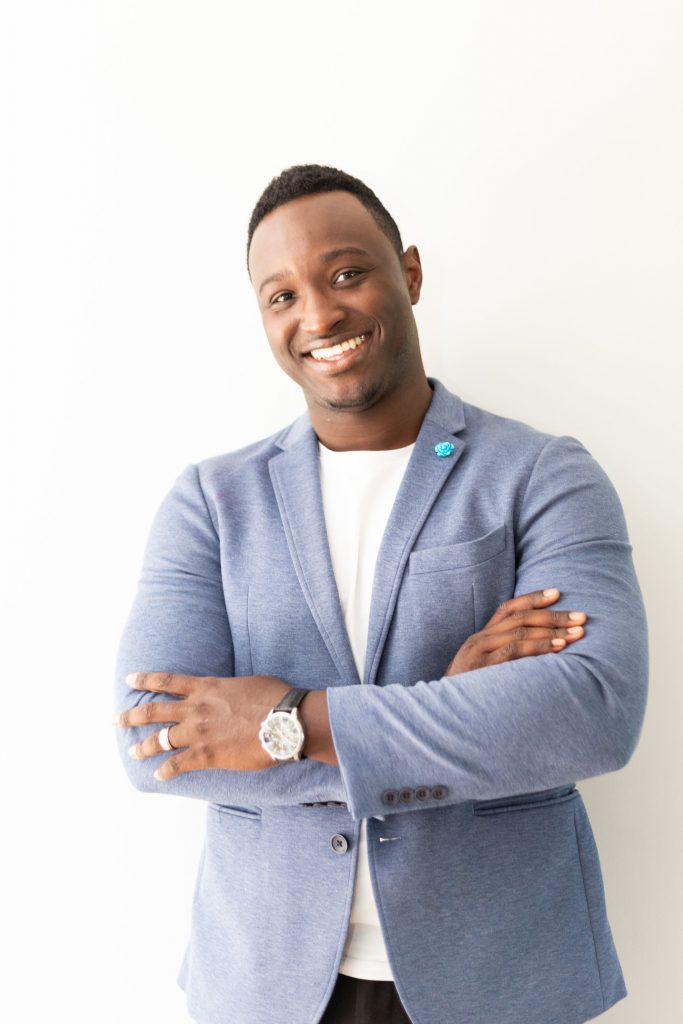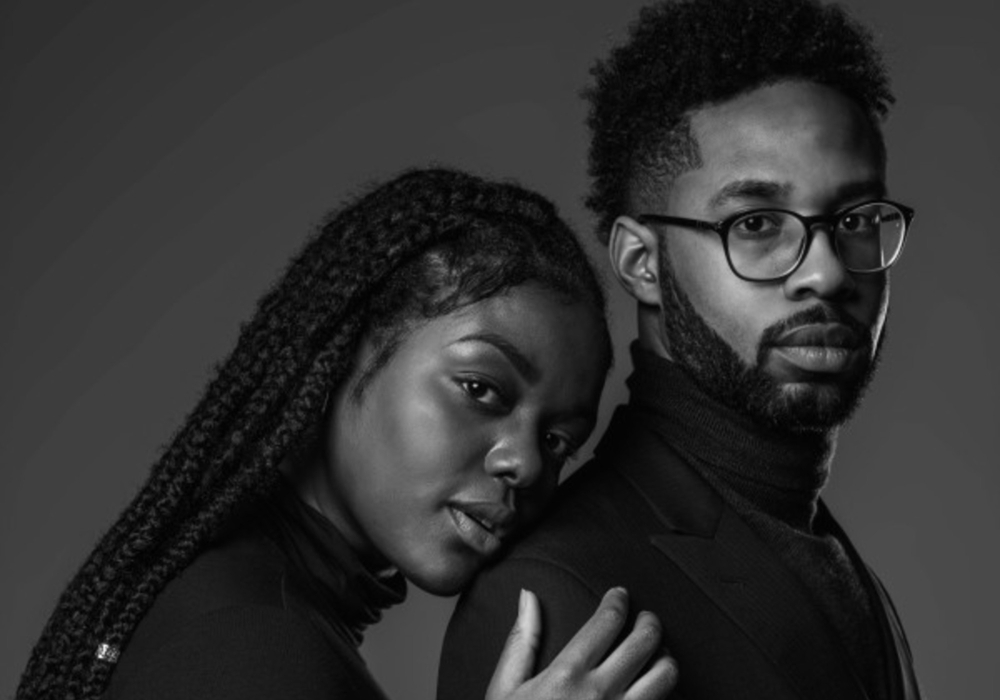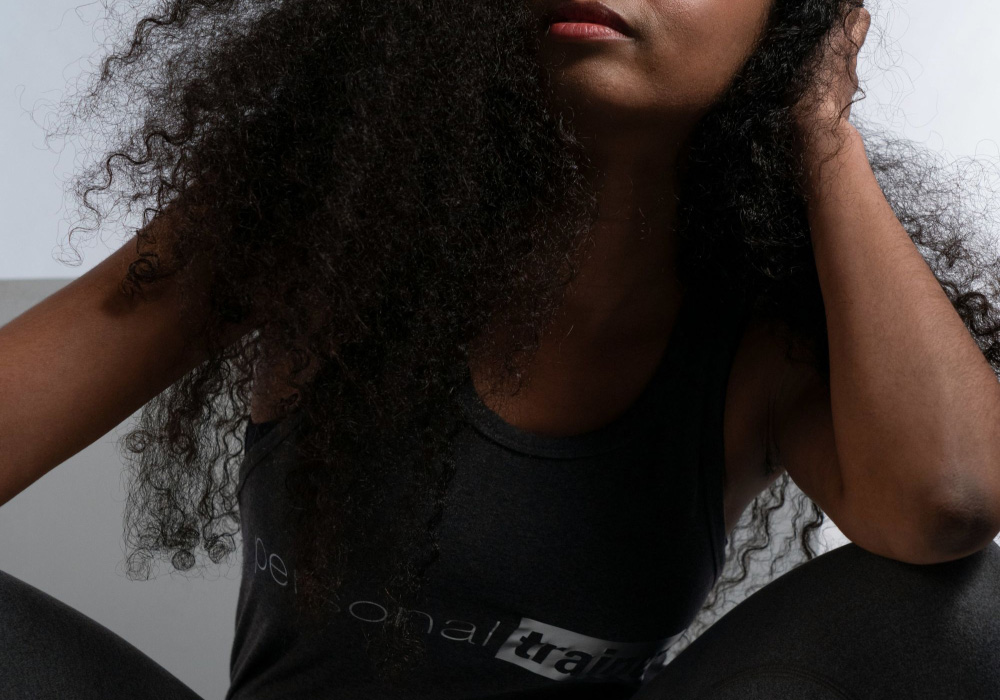Rocheny Alexandre is passionate about social work and mental health advocacy. In this interview, he shares his remarkable journey and his impactful work in Toronto's racialized communities.
Rocheny, born and raised in Haiti, brings with him a rich cultural heritage and a profound understanding of adapting to new environments. He joined us in Canada as a young teenager, facing the arduous task of integrating into the Canadian fabric while carving a path for his future. This transformative period laid the groundwork for his vocation in social work and counselling, leading him to pursue advanced degrees at the University of Ottawa and, ultimately, a career focused on mental health.
Armed with an entrepreneurial spirit and a profound desire to provide culturally sensitive counselling, Rocheny founded Vrai Health and Wellness in Toronto. The organization not only addresses the substantial gap in accessible mental health services for the French-speaking and Black communities but also reflects the complexities of navigating mental health across different cultures and languages.
Today, Rocheny and AfroToornto.com explore the nuances of mental health within the Black and immigrant communities, the effects of the pandemic on our collective well-being, the challenges of entrepreneurship in the health sector, and the support structures needed to aid French-speaking populations in Toronto. Join us as we unravel these critical issues with Rocheny Alexandre, whose experiences and insights are sure to enlighten and inspire.
AfroToronto.com:
Can you tell me a bit more about your background? We always like to start with our guests' personal histories. So, tell me where you're from and how you've gotten into the work you do today.

Rocheny Alexandre:
First of all, I am from a Haitian background. I was born and raised in Haiti, and I came to Canada as a young teenager, I think around 17 or 18. I had a big cultural shock that caused me to rethink my life, my environment, how to find my place in this beautiful country, and what my future would look like. That moment was very important in defining who I would be because it was difficult to find what path I needed to take.
When I checked all the available programs, I saw social work and counselling, which really resonated with me. In our Haitian culture and community, we tend to help support each other, and that's how I started my journey in social work. So, I did my bachelor's and master's degrees at the University of Ottawa.
I also work with different communities, mostly in the mental health sector. I've been in Toronto for the past eight years and have been working in the French-speaking community because we have a big French-speaking community here in Ontario. So, I started that way.
I also started my entrepreneurial journey here in Toronto, in private practice, where we are now a bigger group. So our company is Vrai Health and Wellness. So we also have that component of French and English because we know that when it comes to mental health, especially within the Black community, a combination of language and pre-conceived beliefs sometimes can be a barrier to accessing the services. So imagine being French-speaking, being Black, or living in different other circumstances; that can be an issue in accessing mental health services.
We created a space where we provide custom services and can offer culturally sensitive counselling to people. So, this is kind of like a quick resume of my journey.
AfroToronto.com:
So I've been reading a bit about what you do. We have a similar background, and usually, the immigrant community, you know, our parents, came to this country and worked really hard for the next generation. As you know, our people might be skeptical about mental health. You know, saying, "Why are you putting out your business on the street?" You know, there's this stigma within our community about that.
So, tell me a bit about that. I think it's important to have places like yours where people from immigrant communities can go since there might be a lack of trust to speak to somebody who doesn't look like you. Mental health, talking about your mental health, is frowned upon. The little voice says: "Why are you doing this?" So, I'm interested in learning about your journey through this problem and how you tackle it.
Rocheny Alexandre:
It's so beautiful to hear that you think about this because it's actually something that I encounter a lot, especially in our community. At first, there was that big wave of stigmatization because we're always saying that, especially from the Haitian community perspective. I know it's also the same in different other Black communities, where everyone leans into Christianity—where we're like: "Hey, If I have a problem, just pray, and it's okay. Anxiety is from the devil. Like, this doesn't exist." It was very important for me to break down that stigmatization, even within my own family.
Later on, through my professional path, I brought all my knowledge back to my community workshop or even to my little family to share. And, let's say it, even with my own mom. What are you experiencing here? This is what anxiety is. It doesn't have anything to do with evil, or it doesn't contradict your faith. Actually, it's a form of knowledge about yourself that helps you navigate life.
It was interesting to see how educating ourselves more about anxiety and how any human being experiences this kind of thing really gave us more space to talk about it.
We've done that with parents and at schools. Now, we have a different wave in the Black community, where we see that people are increasingly coming and actually asking about counselling. "I want to talk to a Black person," they say. "I want to talk to someone who can relate, even if the person is not Black, but I want to speak to a person who understands where I'm coming from."
It's a beautiful part of my journey to see that. Education was definitely a way to tackle and unpack all that.
AfroToronto.com:
When you're counselling people, speaking even from my own experience growing up as a Black person in a country like Canada ... I mean, I'm over 50 years old now ... so I've been here since the '70s. So, you encounter racism. I think Black people, in general, need to be almost mentally stronger than most people to deal with all of this at school and work.
The federal government was recently sued by a group of Black federal employees who have recounted that, for years, they've faced career-limiting racial discrimination. So, seeing somebody in the mental health community who doesn't look like you may lead to the belief that they can't understand your reality. So, can you tell me about a specific example of how you've been able to speak to people about this issue and how they felt they were better served by people who look like them and, you know, who better understand their struggle?
Rocheny Alexandre:
There are so many examples and so many different circumstances, I would say. For example, even for any other Black professional, there's also another layer there. Even though you have the knowledge, you're navigating a system that is already built on systemic racism; it's also a different challenge in another way for Black professionals.
Sometimes, as mental health professionals, we're used to being the only Black person in a whole network. We're trying to ensure that we advocate for our community, so it's often a struggle to find the right balance. But, again, more and more, we are also stepping into our strength, which is just talking about our reality as Black people in those circumstances.
I can remember one time in one of my work environments when we observed something very striking and simple. During meetings, you would see everyone sitting together, but the Black people were consciously trying not to all sit together. One day, another colleague came and asked why some of you just don't sit with each other.
The answer was very common among all the Black colleagues. Whenever they were coming to a meeting, they wanted to make sure not to sit all together because they could sometimes be seen as taking up too much space. They were consciously trying not to attract that form of judgment.
As Black professionals, we deal with this. Having that kind of experience, when we bring it to counselling, helps us understand how other people are navigating things in their workplace, how they are navigating things at school, or even how parents in the school system are navigating things. Connecting these shared experiences helps us address deeply entrenched issues.
AfroToronto.com:
Okay. That makes sense. Have you seen a specific impact from the pandemic? I know you've been in this space for many years. Has there been a particular effect of the pandemic on mental health? How has COVID-19 affected mental health in general?
Rocheny Alexandre:
I would say, unfortunately, since COVID, we have seen way more anxiety and social anxiety. A lot among our Black students population also. But it affected everyone, not just the Black community or the BIPOC community. But for us, that's when we were already in a place and struggling with the system. It's actually affected mental health, where we saw a big impact on families. Because a lot of families didn't have the resources to deal with COVID-19. The pandemic really affected how people cope with these things. So there's a big rise in terms of anxiety and terms of social skills for kids. So, that definitely affected the mental health of our community.
AfroToronto.com:
Also, speaking generally about setting up your health and wellness practice, could you speak a bit about your journey as an entrepreneur? As you mentioned earlier, there's a lack of Black professionals like you entering existing structures. But what was your journey like once you decided to start your own venture?
Rocheny Alexandre:
The truth is, I always had that entrepreneurial spirit. For a couple of years, I was in private practice under my own name as a sole proprietor. I was able to help a lot of people. But I also started to see a bigger need in terms of not only helping 10, 20, 50, 60, and 70 people but also felt the need to find a way to expand and try to serve and bring value to the French-speaking and Black communities in the city.
Understanding the realities of the bilingual BIPOC community, I felt I could connect with people all over Ontario and even the rest of Canada. That needs to continue to help us expand into Vraie Health and Wellness, where we offer bilingual counselling for the BIPOC community.
It's also another fight for Black entrepreneurs.
AfroToronto.com:
Speaking of which, can you tell me about RBC's Black Entrepreneur Program? How did you hear about it? And what did you learn through that entrepreneurship program?
Rocheny Alexandre:
The entrepreneurship program came in at a moment when, again, as an entrepreneur and a professional, there were a lot of things to struggle with. Often, as entrepreneurs, we struggle in the first years with cash flow. You struggle with balancing life with family and other obligations.
The RBC Black Entrepreneur Program kind of came into the picture to support and help strike a balance. It helped me establish a financial structure, and it actually helped keep those dreams alive. It also gives us, as entrepreneurs, a chance to continue to grow and build. So that program was actually very helpful. I had a good advisor with whom I'm still in contact. He's always ready to answer any questions and always ready to support.
So, the program helped reinforce our financial structure and gave us the tools we needed to maintain the business and grow our team.
AfroToronto.com:
We spoke about the COVID-19 pandemic earlier. But, in the last few years, there was also, as you know, since the death of George Floyd, a sort of racial reckoning about the importance of systemic racism and the need to address this issue. A lot of private companies, governments, and organizations made statements, posted black squares and made promises to enact change.
I know that you also work with organizations and businesses within your mandate. So, tell me a bit about how you've been able to offer your services to organizations to help them understand better the mental health needs of their Black employees or Black members—whether it's trade unions, companies, or government agencies. What has the journey been like to explain to them the importance of mental health for Black people?
Rocheny Alexandre:
I would say the core component for answering that question is education. It was one of the core things to reinforce the educational aspect of who we are as a community, our reality, and understanding the impact of microaggression on mental health.
Studies have demonstrated the impact of dementia on the Black community due to microaggression or even being exposed to racism. There's a direct link in terms of how those realities affect our brains and how this constant exposure can lead to dementia. It's one of the factors. So we use all those holistic points of view, that research, not only to educate but also to highlight the importance of working as a team and putting in place within those organizations the right tools and system to support people when they are going through certain things and to change mostly their culture. Because your company culture is important. A lot of people nowadays talk a lot about inclusion and diversity, but an organization's culture is central.
Everyone now has someone who handles DEI. But what does it mean for your Black employees when they step in? What does it mean when they are in a team meeting and don't feel comfortable? How do you approach that? How do you stay aware of the privilege that society is reinforcing based on white supremacy? How are we able to address it in a way that is not to blame and not to cancel? People deny things because everyone is scared of being cancelled.
We need to step into self-awareness so we can not only heal but also help our Black colleagues to have an inclusive place where they can feel that we can all work together. Let's heal together so we can grow as a society.
AfroToronto.com:
As a final question, we talked about mental health at work, in society in general, and the need to overcome the stigma around mental health. But, an important institution within any society is the family—whether it is married couples or the dating experience. As you know, times are rough, and people are struggling financially. Oftentimes, the first place where financial pressures affect our lives is at home. So speak to me about couples' therapy. How do people feel about opening up about what's happening at home with their spouse? How do you break those barriers to help them go through that?
Rocheny Alexandre:
So, there are different layers when discussing couples counselling in that context. One of the first things, and we have to start with that, is that we need to give a lot of credit to our women, our Black women. Because they are, most of the time, the gate that leads their families, partners, and their kids to mental health.
It's also another space. I'm a big advocate for supporting men's mental health, but we also, as a community, as Black men, I would like to talk to all of us to say: "Let's continue to prioritize mental health and advocate for it." Also, don't wait for things to get to the point of no return before we act because we usually see that in couples counselling.
Based on my data and extensive research, I'm usually sure I can support that, too. The women will be the ones suggesting it, the ones trying to counsel the husband: "It's time to do it."
So that's another thing we've been working on in terms of changing the narrative and embracing mental health as something you just do. And even for ourselves, as professionals, it's something that we do, and I can be very open. Sometimes, I do counselling, either couples or individuals, just because it's part of how I sustain a healthy lifestyle.
The more I see family strength, the more I am open to it. But that's definitely something that we need to continue to work on. And it's really important to advocate for that and see its benefit for the next generation. When we have the chance to talk about that, to change how we seek counsel and how we welcome that in our couples, it also helps our kids because this is how they learn to deal with and cope with things.
And I see that with so many parents, even in couples counselling. Yeah. We're doing this. We're doing that. We want our kids to be this and that. But how do we deal with them? What do they see? Where do they get the example of how to cope with anxiety, how to deal with conflict healthily, and how to understand that confrontation is not unhealthy? And it's important to be able to do the back and forth and create a healthy space to solve things. So, that has been a beautiful thing to observe throughout this whole journey, even with COVID.
Again, we're very proud of our women in general and especially of our Black women for opening the gate and making sure that our families are supported and receiving the services that they need.





